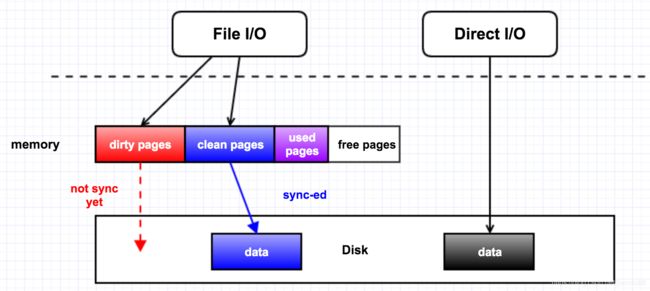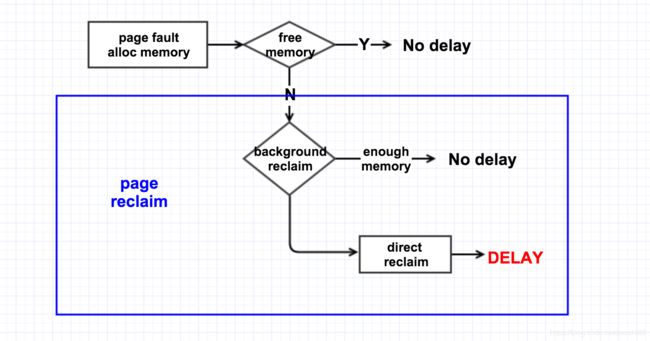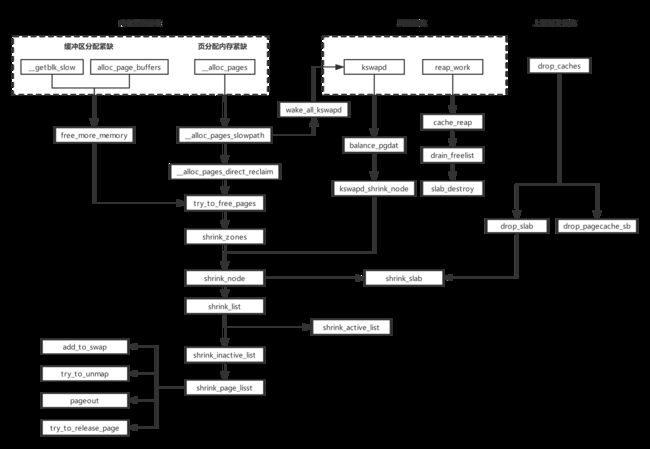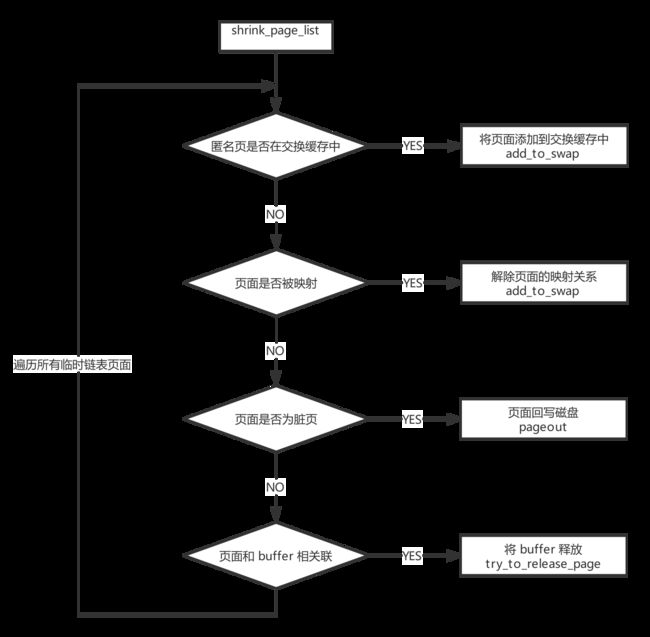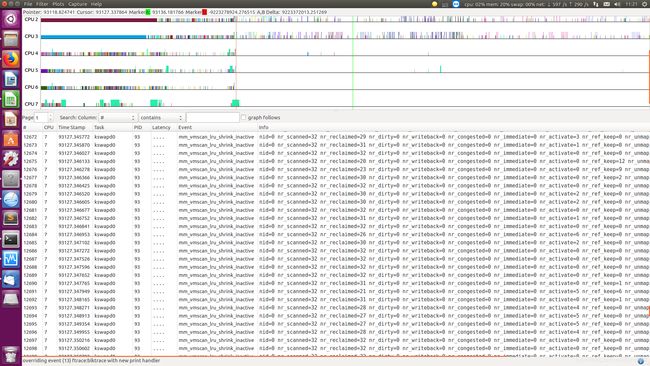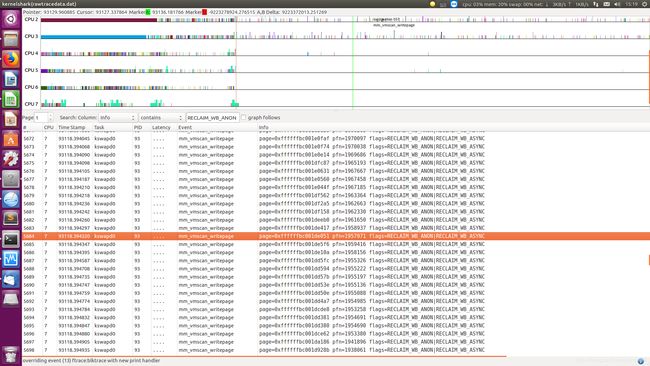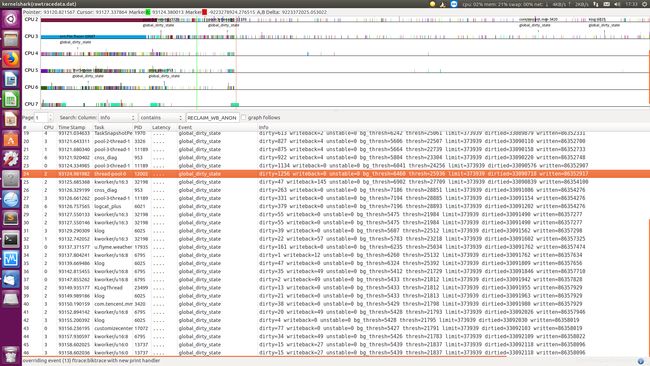BUG 分析: 大量 D 进程卡在 shrink_inactive_list 导致 SWT
Description
一个项目中偶现几十上百个 D 进程卡住在 shrink_inactive_list,导致卡顿/卡死/android SWT 等问题,前前后后,提交了 3 次修复,还没有彻底解决。
山重水复疑无路
LOG:
[149459.897408] [3:2065:watchdog] Binder:1042_16 D 0 9917 635 0x00000008
[149459.897427] [3:2065:watchdog] Call trace:
[149459.897435] [3:2065:watchdog] [] _switch_to+0xb4/0xc0
[149459.897452] [3:2065:watchdog] [] _schedule+0x7f0/0xad0
[149459.897468] [3:2065:watchdog] [] schedule+0x70/0x90
[149459.897485] [3:2065:watchdog] [] schedule_timeout+0x548/0x668
[149459.897502] [3:2065:watchdog] [] msleep+0x28/0x38
[149459.897517] [3:2065:watchdog] [] shrink_inactive_list+0x118/0x998
[149459.897534] [3:2065:watchdog] [] shrink_node_memcg+0xa18/0x1100
[149459.897552] [3:2065:watchdog] [] shrink_node+0x108/0x2f8
[149459.897568] [3:2065:watchdog] [] do_try_to_free_pages+0x178/0x380
[149459.897586] [3:2065:watchdog] [] try_to_free_pages+0x370/0x4d8
[149459.897605] [3:2065:watchdog] [] _alloc_pages_nodemask+0x868/0x1380
[149459.897623] [3:2065:watchdog] [] __do_pagecache_readahead+0xbc/0x358
[149459.897640] [3:2065:watchdog] [] filemapfault+0x11c/0x600
[149459.897647] [3:2065:watchdog] [] ext4_filemap_fault+0x30/0x50
[149459.897664] [3:2065:watchdog] [] handle_pte_fault+0xb38/0xfa8
[149459.897681] [3:2065:watchdog] [] handle_mm_fault+0x1d0/0x328
[149459.897699] [3:2065:watchdog] [] do_page_fault+0x2a0/0x3e0
[149459.897716] [3:2065:watchdog] [] do_translation_fault+0x44/0xa8
[149459.897732] [3:2065:watchdog] [] do_mem_abort+0x4c/0xd0
[149459.897750] [3:2065:watchdog] [] el0_da+0x20/0x24
[149459.897767] [3:2065:watchdog] Binder:1042_19 D 0 11188 635 0x00000008
[149459.897786] [3:2065:watchdog] Call trace:
[149459.897797] [3:2065:watchdog] [] _switch_to+0xb4/0xc0
[149459.897804] [3:2065:watchdog] [] _schedule+0x7f0/0xad0
[149459.897820] [3:2065:watchdog] [] schedule+0x70/0x90
[149459.897835] [3:2065:watchdog] [] schedule_timeout+0x548/0x668
[149459.897853] [3:2065:watchdog] [] msleep+0x28/0x38
[149459.897868] [3:2065:watchdog] [] shrink_inactive_list+0x118/0x998
[149459.897887] [3:2065:watchdog] [] shrink_node_memcg+0xa18/0x1100
[149459.897904] [3:2065:watchdog] [] shrink_node+0x108/0x2f8
[149459.897922] [3:2065:watchdog] [] do_try_to_free_pages+0x178/0x380
[149459.897940] [3:2065:watchdog] [] try_to_free_pages+0x370/0x4d8
[149459.897957] [3:2065:watchdog] [] __alloc_pages_nodemask+0x868/0x1380
[149459.897977] [3:2065:watchdog] [] _do_page_cache_readahead+0xbc/0x358
[149459.897996] [3:2065:watchdog] [] filemap_fault+0x11c/0x600
[149459.898013] [3:2065:watchdog] [] ext4_filemap_fault+0x30/0x50
[149459.898031] [3:2065:watchdog] [] handle_pte_fault+0xb38/0xfa8
[149459.898048] [3:2065:watchdog] [] handle_mm_fault+0x1d0/0x328
[149459.898065] [3:2065:watchdog] [] do_page_fault+0x2a0/0x3e0
[149459.898083] [3:2065:watchdog] [] do_translation_fault+0x44/0xa8
[149459.898100] [3:2065:watchdog] [] do_el0_ia_bp_hardening+0xc0/0x158
[149459.898118] [3:2065:watchdog] [] el0_ia+0x1c/0x20
现象:大量进程从缺页异常入口,调用内存回收接口: shrink_inactive_list -> msleep ,使得该进程状态变为 D.
void msleep(unsigned int msecs)
{
unsigned long timeout = msecs_to_jiffies(msecs) + 1;
while (timeout)
timeout = schedule_timeout_uninterruptible(timeout);
}
signed long __sched schedule_timeout_uninterruptible(signed long timeout)
{
__set_current_state(TASK_UNINTERRUPTIBLE);
return schedule_timeout(timeout);
}
D 进程就是被设置了 TASK_UNINTERRUPTIBLE 进程状态,不可中断的睡眠状态。不可中断,指的并不是 CPU 不响应外部硬件的中断,而是指进程不响应异步信号,信号只会挂到信号队列,而没有机会去立即执行。它不占用 cpu,也不能被杀掉,很直观的现象就是,kill -9 一个 D 进程,是没有效果的,只有等进程获得资源被唤醒才处理信号,才处理 SIGKILL。
static noinline_for_stack unsigned long
shrink_inactive_list(unsigned long nr_to_scan, struct lruvec *lruvec,
struct scan_control *sc, enum lru_list lru)
{
......
while (unlikely(too_many_isolated(pgdat, file, sc, stalled))) {
if (stalled)
return 0;
/* wait a bit for the reclaimer. */
msleep(100); ////////////////////// 卡在这里
stalled = true;
/* We are about to die and free our memory. Return now. */
if (fatal_signal_pending(current))
return SWAP_CLUSTER_MAX;
}
......
初步定位:
该函数已经有跳出功能,不会一直卡住,最多 2 次就会退出去。
说明是大量的进程疯狂地调用 shrink_inactive_list 又被阻塞了一下子,又退出去,又掉进来。所以,不是一直卡死,而是性能瓶颈拥堵在这个地方,congestion.
从上层 systrace 也能看到,很有规律的大概 110ms 一段的 D 状态,一个进程甚至可以持续几十秒。
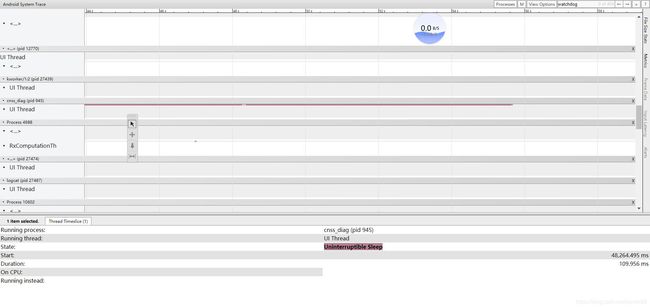
说明隔离页面过多,sleep 100ms,猜测目的是 1. 给时间处理隔离页面,回写文件页到磁盘 2. 是控制并发,也许另一个 cpu 也在同样的回收流程导致隔离页这在时刻变大。
所以初步定了两个方向,疑点:
一是内存回收瓶颈,内存回收不及时,内存需求量巨大,而 LMK 没触发,内存有很多匿名页,都在回收和回写文件页等。
二是 io 读写瓶颈,io 速率慢,某个时间段速率变慢,ufs 频率低,上层读写大量数据,io 占用率过高等。
需要澄清这些疑点。
插播一些背景知识
page cache
导致这个情况的原因是:进程在申请内存的时候,发现该 zone 的 freelist 上已经没有足够的内存可用,所以不得不去从该 zone 的 LRU 链表里回收 inactive 的page,这种情况就是 direct reclaim(直接回收)。direct reclaim 会比较消耗时间的原因是,如果回收的是 dirty page,就会触发磁盘 IO 的操作,它会首先把 dirty page 里面的内容给回写到磁盘作同步,再去把该 page 给放到 freelist 里。
下图来看下 memory,page cache,Disk I/O 的关系。
举个简单的例子,比如我们 open 一个文件时,如果没有使用 O_DIRECT 这个flag,那就是 File I/O, 所有对磁盘文件的访问都要经过内存,内存会把这部分数据给缓存起来;但是如果使用了 O_DIRECT 这个flag,那就是 Direct I/O, 它会绕过内存而去直接访问磁盘,访问的这部分数据也不会被缓存起来,自然性能上会降低很多。
page reclaim
在直观上,我们有一个认知,我们现在读了一个文件,它会被缓存到内存里面,如果接下来的一个月我们一直都不会再次访问它,而且我们这一个月都不会关闭或者重启机器,那么在这一个月之后该文件就不应该再在内存里头了。这就是内核对 page cache 的管理策略:LRU(最近最少使用)。即把最近最少使用的 page cache 给回收为 free pages。(页框回收算法 PFRA 远没有这么简单)
内核的页回收机制有两种:后台周期性回收和直接回收。
后台回收是有一个内核线程 kswapd 来做,当内存里 free 的 pages 低于一个水位(page_low)时,就会唤醒该内核线程,然后它从 LRU 链表里回收 page cache 到内存的 free_list 里头,它会一直回收直至 free 的 pages 达到另外一个水位 page_high 才停止. 如下图所示,
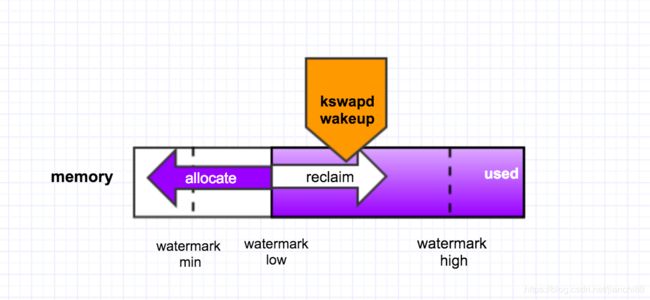
直接回收则是,在发生 page fault/alloc memory 时,没有足够可用的内存,于是线程就自己直接去回收内存,它一次性的会回收 32 个 pages。逻辑过程如下图所示,
所以,在内存优化上,1. 抬高 watermark 可以间接减少内存回收的并发量,减轻卡在 shrink_inactive_list. 2. 提高回收效率,如 LMK 的效率。
然而,还是没彻底解决这个问题,所以我们把疑点再次指向 io。
尝试抓取更多的信息,来了解触发瓶颈的微观过程。
- 跑 monkey 增加 io 使用率、io 读写速度监控,以时间片为 100ms,监控连续 D 状态,并收集 D 进程堆栈信息、内存信息等。
- 打开 ftarce 的 vmscan 和 writeback 两个监控点,apk 监控到持续 D 状态就进dump,从 dump 解析 ftrace,再使用 kernelshark 来观察一些数据。
echo 1 > /sys/kernel/debug/tracing/events/writeback/enable
echo 1 > /sys/kernel/debug/tracing/events/vmscan/enable
echo 1 > /sys/kernel/debug/tracing/tracing_on
为了准备再深入上述的微观过程,需要再补充一些代码和流程图:
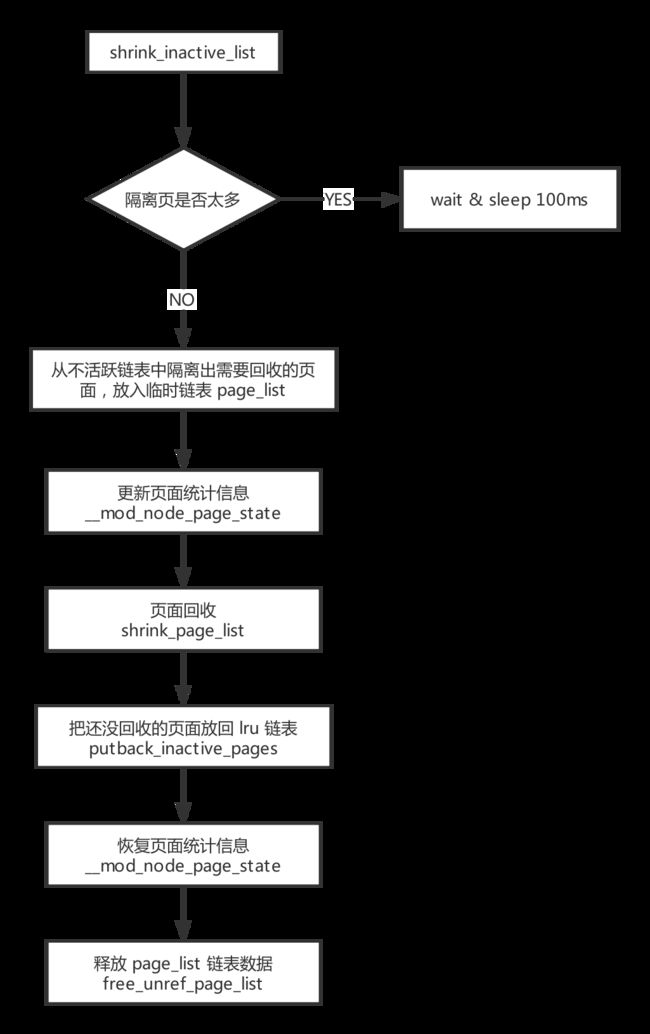 shrink_inactive_list
shrink_inactive_list
收缩不活跃链表
/*
* shrink_inactive_list() is a helper for shrink_node(). It returns the number
* of reclaimed pages
*/
static noinline_for_stack unsigned long
shrink_inactive_list(unsigned long nr_to_scan, struct lruvec *lruvec,
struct scan_control *sc, enum lru_list lru)
{
LIST_HEAD(page_list);
unsigned long nr_scanned;
unsigned long nr_reclaimed = 0;
unsigned long nr_taken;
struct reclaim_stat stat = {};
isolate_mode_t isolate_mode = 0;
int file = is_file_lru(lru);
struct pglist_data *pgdat = lruvec_pgdat(lruvec);
struct zone_reclaim_stat *reclaim_stat = &lruvec->reclaim_stat;
bool stalled = false;
while (unlikely(too_many_isolated(pgdat, file, sc))) { //如果隔离的页太多就进入睡眠
if (stalled)
return 0;
/* We are about to die and free our memory. Return now. */
if (fatal_signal_pending(current))
return SWAP_CLUSTER_MAX;
/* wait a bit for the reclaimer. */
msleep(100);
stalled = true;
}
//将 lru 缓存中的页移到各个 lru 链表中去
lru_add_drain();
if (!sc->may_unmap)
isolate_mode |= ISOLATE_UNMAPPED;
spin_lock_irq(&pgdat->lru_lock);
//隔离部分 lru 中的页,保存到临时链表 page_list 中
nr_taken = isolate_lru_pages(nr_to_scan, lruvec, &page_list,
&nr_scanned, sc, isolate_mode, lru);
//相关统计信息更新
__mod_node_page_state(pgdat, NR_ISOLATED_ANON + file, nr_taken);
reclaim_stat->recent_scanned[file] += nr_taken;
if (current_is_kswapd()) {
if (global_reclaim(sc))
__count_vm_events(PGSCAN_KSWAPD, nr_scanned);
count_memcg_events(lruvec_memcg(lruvec), PGSCAN_KSWAPD,
nr_scanned);
} else {
if (global_reclaim(sc))
__count_vm_events(PGSCAN_DIRECT, nr_scanned);
count_memcg_events(lruvec_memcg(lruvec), PGSCAN_DIRECT,
nr_scanned);
}
spin_unlock_irq(&pgdat->lru_lock);
if (nr_taken == 0)
return 0;
//执行页面回收,待回收的页放在 page_list 中,回收完成之后没有被回收的页也被放在 page_list 中返回
nr_reclaimed = shrink_page_list(&page_list, pgdat, sc, 0,
&stat, false);
spin_lock_irq(&pgdat->lru_lock);
if (current_is_kswapd()) {
if (global_reclaim(sc))
__count_vm_events(PGSTEAL_KSWAPD, nr_reclaimed);
count_memcg_events(lruvec_memcg(lruvec), PGSTEAL_KSWAPD,
nr_reclaimed);
} else {
if (global_reclaim(sc))
__count_vm_events(PGSTEAL_DIRECT, nr_reclaimed);
count_memcg_events(lruvec_memcg(lruvec), PGSTEAL_DIRECT,
nr_reclaimed);
}
//将没有回收的页放回对应链表中,如果页的引用计数为 0 就放到 page_list 中返回
putback_inactive_pages(lruvec, &page_list);
__mod_node_page_state(pgdat, NR_ISOLATED_ANON + file, -nr_taken);
spin_unlock_irq(&pgdat->lru_lock);
mem_cgroup_uncharge_list(&page_list);
//释放掉引用计数变为 0 的页
free_unref_page_list(&page_list);
/*
* If dirty pages are scanned that are not queued for IO, it
* implies that flushers are not doing their job. This can
* happen when memory pressure pushes dirty pages to the end of
* the LRU before the dirty limits are breached and the dirty
* data has expired. It can also happen when the proportion of
* dirty pages grows not through writes but through memory
* pressure reclaiming all the clean cache. And in some cases,
* the flushers simply cannot keep up with the allocation
* rate. Nudge the flusher threads in case they are asleep.
*/
if (stat.nr_unqueued_dirty == nr_taken)
wakeup_flusher_threads(WB_REASON_VMSCAN);
sc->nr.dirty += stat.nr_dirty;
sc->nr.congested += stat.nr_congested;
sc->nr.unqueued_dirty += stat.nr_unqueued_dirty;
sc->nr.writeback += stat.nr_writeback;
sc->nr.immediate += stat.nr_immediate;
sc->nr.taken += nr_taken;
if (file)
sc->nr.file_taken += nr_taken;
trace_mm_vmscan_lru_shrink_inactive(pgdat->node_id,
nr_scanned, nr_reclaimed, &stat, sc->priority, file);
return nr_reclaimed;
}
页面回收
/*
* shrink_page_list() returns the number of reclaimed pages
*/
static unsigned long shrink_page_list(struct list_head *page_list,
struct pglist_data *pgdat,
struct scan_control *sc,
enum ttu_flags ttu_flags,
struct reclaim_stat *stat,
bool force_reclaim)
{
LIST_HEAD(ret_pages);
LIST_HEAD(free_pages);
int pgactivate = 0;
unsigned nr_unqueued_dirty = 0;
unsigned nr_dirty = 0;
unsigned nr_congested = 0;
unsigned nr_reclaimed = 0;
unsigned nr_writeback = 0;
unsigned nr_immediate = 0;
unsigned nr_ref_keep = 0;
unsigned nr_unmap_fail = 0;
cond_resched();
while (!list_empty(page_list)) {//遍历链表 page_list 直到为空
struct address_space *mapping;
struct page *page;
int may_enter_fs;
enum page_references references = PAGEREF_RECLAIM;
bool dirty, writeback;
cond_resched();
page = lru_to_page(page_list);
list_del(&page->lru);
//如果页被锁住就跳过该页
if (!trylock_page(page))
goto keep;
VM_BUG_ON_PAGE(PageActive(page), page);
if (pgdat)
VM_BUG_ON_PAGE(page_pgdat(page) != pgdat, page);
sc->nr_scanned++;//增加扫描计数
if (unlikely(!page_evictable(page)))//如果是 un evictable 页就尝试设置 activate 并放到 ret_pages 中
goto activate_locked;
//如果页是映射到进程的,但是不允许回收映射了的页就将页解锁后放到 ret_pages 中
if (!sc->may_unmap && page_mapped(page))
goto keep_locked;
/*如果是映射页或者交换缓存中的页就 double 扫描计数,这说明可扫描的页不多应当尽快结束页扫描,否者会影响系统性能*/
/* Double the slab pressure for mapped and swapcache pages */
if ((page_mapped(page) || PageSwapCache(page)) &&
!(PageAnon(page) && !PageSwapBacked(page)))
sc->nr_scanned++;
//标记是否允许文件系统操作
may_enter_fs = (sc->gfp_mask & __GFP_FS) ||
(PageSwapCache(page) && (sc->gfp_mask & __GFP_IO));
/*
* The number of dirty pages determines if a node is marked
* reclaim_congested which affects wait_iff_congested. kswapd
* will stall and start writing pages if the tail of the LRU
* is all dirty unqueued pages.
*/
//判断页是否为脏或者处于回写中
page_check_dirty_writeback(page, &dirty, &writeback);
if (dirty || writeback)
nr_dirty++;
//脏但是没有回写,说明页没有被加入块设备请求队列
if (dirty && !writeback)
nr_unqueued_dirty++;
/*
* Treat this page as congested if the underlying BDI is or if
* pages are cycling through the LRU so quickly that the
* pages marked for immediate reclaim are making it to the
* end of the LRU a second time.
*/
//如果是文件映射返回页的 mapping ,如果是匿名映射返回 NULL,如果在交换缓存中返回 swapper_spaces
mapping = page_mapping(page);
//两种情况会增加阻塞页框计数:1)脏页或者正在回写的页,而且当前页所在 inode 的阻塞标志置位;2)页处于回写中而且标记页正在被回收
if (((dirty || writeback) && mapping &&
inode_write_congested(mapping->host)) ||
(writeback && PageReclaim(page)))
nr_congested++;
/*
* If a page at the tail of the LRU is under writeback, there
* are three cases to consider.
*
* 1) If reclaim is encountering an excessive number of pages
* under writeback and this page is both under writeback and
* PageReclaim then it indicates that pages are being queued
* for IO but are being recycled through the LRU before the
* IO can complete. Waiting on the page itself risks an
* indefinite stall if it is impossible to writeback the
* page due to IO error or disconnected storage so instead
* note that the LRU is being scanned too quickly and the
* caller can stall after page list has been processed.
*
* 2) Global or new memcg reclaim encounters a page that is
* not marked for immediate reclaim, or the caller does not
* have __GFP_FS (or __GFP_IO if it's simply going to swap,
* not to fs). In this case mark the page for immediate
* reclaim and continue scanning.
*
* Require may_enter_fs because we would wait on fs, which
* may not have submitted IO yet. And the loop driver might
* enter reclaim, and deadlock if it waits on a page for
* which it is needed to do the write (loop masks off
* __GFP_IO|__GFP_FS for this reason); but more thought
* would probably show more reasons.
*
* 3) Legacy memcg encounters a page that is already marked
* PageReclaim. memcg does not have any dirty pages
* throttling so we could easily OOM just because too many
* pages are in writeback and there is nothing else to
* reclaim. Wait for the writeback to complete.
*
* In cases 1) and 2) we activate the pages to get them out of
* the way while we continue scanning for clean pages on the
* inactive list and refilling from the active list. The
* observation here is that waiting for disk writes is more
* expensive than potentially causing reloads down the line.
* Since they're marked for immediate reclaim, they won't put
* memory pressure on the cache working set any longer than it
* takes to write them to disk.
*/
if (PageWriteback(page)) {//页处于回写中,下面处理都是基于这一前提
//设置标志 PGDAT_WRITEBACK 标识有大量的页处于回写中
/* Case 1 above */
if (current_is_kswapd() &&//当前线程是 kswapd 线程
PageReclaim(page) &&//页处于回收过程中
(pgdat &&
test_bit(PGDAT_WRITEBACK, &pgdat->flags))) {
nr_immediate++;//增加 nr_immediate 统计,表示页即将被回收
goto activate_locked;//将页放到 ret_pages 中返回
/* Case 2 above */
} else if (sane_reclaim(sc) ||//如果回收的是整个内存域就返回true
!PageReclaim(page) || !may_enter_fs) {
/*
* This is slightly racy - end_page_writeback()
* might have just cleared PageReclaim, then
* setting PageReclaim here end up interpreted
* as PageReadahead - but that does not matter
* enough to care. What we do want is for this
* page to have PageReclaim set next time memcg
* reclaim reaches the tests above, so it will
* then wait_on_page_writeback() to avoid OOM;
* and it's also appropriate in global reclaim.
*/
SetPageReclaim(page);
nr_writeback++;//增加回写页计数
goto activate_locked;
/* Case 3 above */
} else {
unlock_page(page);
wait_on_page_writeback(page);//等页回写完成
/* then go back and try same page again */
list_add_tail(&page->lru, page_list);//将页放到 page_list 中下次考虑
continue;
}
}
//如果没有设置强制回收就检查页的访问情况
if (!force_reclaim)
references = page_check_references(page, sc);
switch (references) {
case PAGEREF_ACTIVATE:
goto activate_locked;//如果页近期两次被访问过就尝试设置 activate 并放到 ret_pages 中
case PAGEREF_KEEP:
nr_ref_keep++;//如果页近期被访问过一次就将其放到 ret_pages 中
goto keep_locked;
case PAGEREF_RECLAIM:
case PAGEREF_RECLAIM_CLEAN:
; /* try to reclaim the page below *///下面尝试回收这个页
}
/*
* Anonymous process memory has backing store?
* Try to allocate it some swap space here.
* Lazyfree page could be freed directly
*/
//如果是匿名页而且不在交换缓存中就将其添加到交换缓存
if (PageAnon(page) && PageSwapBacked(page)) {
if (!PageSwapCache(page)) {
if (!(sc->gfp_mask & __GFP_IO))
goto keep_locked;
if (PageTransHuge(page)) {
/* cannot split THP, skip it */
if (!can_split_huge_page(page, NULL))
goto activate_locked;
/*
* Split pages without a PMD map right
* away. Chances are some or all of the
* tail pages can be freed without IO.
*/
if (!compound_mapcount(page) &&
split_huge_page_to_list(page,
page_list))
goto activate_locked;
}
if (!add_to_swap(page)) {
if (!PageTransHuge(page))
goto activate_locked;
/* Fallback to swap normal pages */
if (split_huge_page_to_list(page,
page_list))
goto activate_locked;
#ifdef CONFIG_TRANSPARENT_HUGEPAGE
count_vm_event(THP_SWPOUT_FALLBACK);
#endif
if (!add_to_swap(page))
goto activate_locked;
}
may_enter_fs = 1;//允许文件系统操作
/* Adding to swap updated mapping */
mapping = page_mapping(page);
}
} else if (unlikely(PageTransHuge(page))) {
/* Split file THP */
if (split_huge_page_to_list(page, page_list))
goto keep_locked;
}
/*
* The page is mapped into the page tables of one or more
* processes. Try to unmap it here.
*/
if (page_mapped(page)) {//如果页有被映射到进程就尝试解除映射
enum ttu_flags flags = ttu_flags | TTU_BATCH_FLUSH;
if (unlikely(PageTransHuge(page)))
flags |= TTU_SPLIT_HUGE_PMD;
if (!try_to_unmap(page, flags, sc->target_vma)) {
nr_unmap_fail++;
goto activate_locked;
}
}
/*不写出的情况:1)非kswapd进程,只有 kswapd 才能文件系统操作,否者可能递归导致栈溢出;2)不是正在回收的页;3)不是正在做大量脏页回写*/
if (PageDirty(page)) {
/*
* Only kswapd can writeback filesystem pages
* to avoid risk of stack overflow. But avoid
* injecting inefficient single-page IO into
* flusher writeback as much as possible: only
* write pages when we've encountered many
* dirty pages, and when we've already scanned
* the rest of the LRU for clean pages and see
* the same dirty pages again (PageReclaim).
*/
if (page_is_file_cache(page) &&
(!current_is_kswapd() || !PageReclaim(page) ||
(pgdat &&
!test_bit(PGDAT_DIRTY, &pgdat->flags)))) {
/*
* Immediately reclaim when written back.
* Similar in principal to deactivate_page()
* except we already have the page isolated
* and know it's dirty
*/
inc_node_page_state(page, NR_VMSCAN_IMMEDIATE);
SetPageReclaim(page);
goto activate_locked;
}
if (references == PAGEREF_RECLAIM_CLEAN)
goto keep_locked;
if (!may_enter_fs)
goto keep_locked;
if (!sc->may_writepage)
goto keep_locked;
/*
* Page is dirty. Flush the TLB if a writable entry
* potentially exists to avoid CPU writes after IO
* starts and then write it out here.
*/
try_to_unmap_flush_dirty();
switch (pageout(page, mapping, sc)) {//将页写出
case PAGE_KEEP:
goto keep_locked;
case PAGE_ACTIVATE:
goto activate_locked;
case PAGE_SUCCESS:
if (PageWriteback(page))
goto keep;
if (PageDirty(page))//如果页被再次弄脏
goto keep;
/*
* A synchronous write - probably a ramdisk. Go
* ahead and try to reclaim the page.
*/
if (!trylock_page(page))
goto keep;
if (PageDirty(page) || PageWriteback(page))//页被弄脏或者在回写中
goto keep_locked;
mapping = page_mapping(page);
case PAGE_CLEAN:
; /* try to free the page below */
}
}
/*
* If the page has buffers, try to free the buffer mappings
* associated with this page. If we succeed we try to free
* the page as well.
*
* We do this even if the page is PageDirty().
* try_to_release_page() does not perform I/O, but it is
* possible for a page to have PageDirty set, but it is actually
* clean (all its buffers are clean). This happens if the
* buffers were written out directly, with submit_bh(). ext3
* will do this, as well as the blockdev mapping.
* try_to_release_page() will discover that cleanness and will
* drop the buffers and mark the page clean - it can be freed.
*
* Rarely, pages can have buffers and no ->mapping. These are
* the pages which were not successfully invalidated in
* truncate_complete_page(). We try to drop those buffers here
* and if that worked, and the page is no longer mapped into
* process address space (page_count == 1) it can be freed.
* Otherwise, leave the page on the LRU so it is swappable.
*/
if (page_has_private(page)) {
if (!try_to_release_page(page, sc->gfp_mask))//释放掉页的buffer
goto activate_locked;
if (!mapping && page_count(page) == 1) {
unlock_page(page);
if (put_page_testzero(page))
goto free_it;
else {
/*
* rare race with speculative reference.
* the speculative reference will free
* this page shortly, so we may
* increment nr_reclaimed here (and
* leave it off the LRU).
*/
nr_reclaimed++;
continue;
}
}
}
if (PageAnon(page) && !PageSwapBacked(page)) {
/* follow __remove_mapping for reference */
if (!page_ref_freeze(page, 1))
goto keep_locked;
if (PageDirty(page)) {
page_ref_unfreeze(page, 1);
goto keep_locked;
}
count_vm_event(PGLAZYFREED);
count_memcg_page_event(page, PGLAZYFREED);
} else if (!mapping || !__remove_mapping(mapping, page, true))//从页缓存中删除
goto keep_locked;
/*
* At this point, we have no other references and there is
* no way to pick any more up (removed from LRU, removed
* from pagecache). Can use non-atomic bitops now (and
* we obviously don't have to worry about waking up a process
* waiting on the page lock, because there are no references.
*/
__ClearPageLocked(page);
free_it:
nr_reclaimed++;
/*
* Is there need to periodically free_page_list? It would
* appear not as the counts should be low
*/
if (unlikely(PageTransHuge(page))) {
mem_cgroup_uncharge(page);
(*get_compound_page_dtor(page))(page);
} else
list_add(&page->lru, &free_pages); //将页挂到 free_pages 中等待释放
/*
* If pagelist are from multiple nodes, we should decrease
* NR_ISOLATED_ANON + x on freed pages in here.
*/
if (!pgdat)
dec_node_page_state(page, NR_ISOLATED_ANON +
page_is_file_cache(page));
continue;
activate_locked:
/* Not a candidate for swapping, so reclaim swap space. */
if (PageSwapCache(page) && (mem_cgroup_swap_full(page) ||
PageMlocked(page)))
try_to_free_swap(page);
VM_BUG_ON_PAGE(PageActive(page), page);
if (!PageMlocked(page)) {
SetPageActive(page);
pgactivate++;
count_memcg_page_event(page, PGACTIVATE);
}
keep_locked:
unlock_page(page);
keep:
list_add(&page->lru, &ret_pages);
VM_BUG_ON_PAGE(PageLRU(page) || PageUnevictable(page), page);
}
mem_cgroup_uncharge_list(&free_pages);
try_to_unmap_flush();
free_unref_page_list(&free_pages);
list_splice(&ret_pages, page_list);//等待进一步处理的页
count_vm_events(PGACTIVATE, pgactivate);
if (stat) {
stat->nr_dirty = nr_dirty;
stat->nr_congested = nr_congested;
stat->nr_unqueued_dirty = nr_unqueued_dirty;
stat->nr_writeback = nr_writeback;
stat->nr_immediate = nr_immediate;
stat->nr_activate = pgactivate;
stat->nr_ref_keep = nr_ref_keep;
stat->nr_unmap_fail = nr_unmap_fail;
}
return nr_reclaimed;
}
ftrace + kernelshark 辅助分析
执行页面回收中页面状态
ftrace 会抓取下面这些信息统计,所以提前了解下。
struct reclaim_stat {
unsigned nr_dirty;// page_list中脏页数
unsigned nr_unqueued_dirty;// page_list中脏页但是没有放入块设备请求队列中的页数
unsigned nr_congested;// page_list中阻塞的页数
unsigned nr_writeback; // page_list中处于回写中但是不是被回收的页数
unsigned nr_immediate; //page_list中即回写中而且即将被回收的页数
unsigned nr_activate;// page_list中近期被访问过需要添加到 activate list 的页数
unsigned nr_ref_keep;// page_list中近期被访问过的页数
unsigned nr_unmap_fail;//解除映射失败的页数
};
图中显示 nr_dirty,nr_congested,nr_writeback 几乎都是 0,只有零星 nr_activate 被再访问的页面添加回 active list.
说明现场不存在 dirty 页面很多,回写 io 遇到瓶颈的情况。这个猜想不成立。
图中显示在 34 秒内,所有在 pageout() 中的页面,全是 anon 页面,没有 file ?
查看 writeback trace event.
同样,没有很多 writeback 量
从测试结果看到:
- apk 监控到的 io 使用率不高
- 从 ftrace 看到回写量不大
通过最新的数据信息,回到之前的两个大方向:
一是内存紧缺,内存回收不及时,内存需求量大。LMK 没触发,内存有很多匿名页,都在回收和回写文件页等。(抬高水位、加速 LMK 触发,还有复现,不能彻底解决)二是 io 速率慢,某个时间段速率变慢,ufs 频率低,上层读写大量数据,io 占用率过高等。(数据证明,io 量不多,没有瓶颈)
那么,之前的两个方向猜想,都落空了。那会是什么意想不到的原因?
那回去看看卡住的代码,too_many_isolated 代码。
static int __too_many_isolated(struct pglist_data *pgdat, int file,
struct scan_control *sc, bool stalled)
{
unsigned long inactive, isolated;
if (file) {
if (stalled) {
inactive = node_page_state_snapshot(pgdat,
NR_INACTIVE_FILE);
isolated = node_page_state_snapshot(pgdat,
NR_ISOLATED_FILE);
} else {
inactive = node_page_state(pgdat, NR_INACTIVE_FILE);
isolated = node_page_state(pgdat, NR_ISOLATED_FILE);
}
} else {
if (stalled) {
inactive = node_page_state_snapshot(pgdat,
NR_INACTIVE_ANON);
isolated = node_page_state_snapshot(pgdat,
NR_ISOLATED_ANON);
} else {
inactive = node_page_state(pgdat, NR_INACTIVE_ANON);
isolated = node_page_state(pgdat, NR_ISOLATED_ANON);
}
}
/*
* GFP_NOIO/GFP_NOFS callers are allowed to isolate more pages, so they
* won't get blocked by normal direct-reclaimers, forming a circular
* deadlock.
*/
if ((sc->gfp_mask & (__GFP_IO | __GFP_FS)) == (__GFP_IO | __GFP_FS))
inactive >>= 3;
return isolated > inactive;
}
没有很复杂的逻辑,只有简单的 isolated 和 inactive 统计计数比较。
所以,只能是更直接的猜想:isolated file 统计一直偏大,导致一直判断 too_many_isolated 为真,卡在 shrink_inactive_list.
根据这个猜想,从 log 中打印的 mem info,也看到 isolated file 一直偏大,一直在增加,不会减少。好像印证了猜想似的。
LOG:
<6>[95299.607369] isolated(anon):0kB isolated(file):37880kB
<6>[95318.568833] isolated(anon):0kB isolated(file):37752kB
<6>[95323.773350] isolated(anon):0kB isolated(file):37752kB
<6>[97520.184804] isolated(anon):0kB isolated(file):44604kB
<6>[97525.658037] isolated(anon):0kB isolated(file):44604kB
<6>[97754.256431] isolated(anon):0kB isolated(file):44604kB
<6>[97759.418172] isolated(anon):0kB isolated(file):44604kB
<6>[97764.574908] isolated(anon):0kB isolated(file):44604kB
<6>[97769.735128] isolated(anon):0kB isolated(file):44604kB
<6>[98543.638667] isolated(anon):0kB isolated(file):44684kB
<6>[98548.905397] isolated(anon):0kB isolated(file):44684kB
<6>[98554.209671] isolated(anon):0kB isolated(file):44684kB
<6>[99996.798031] isolated(anon):0kB isolated(file):51572kB
<6>[100002.122853] isolated(anon):0kB isolated(file):51572kB
<6>[100007.359023] isolated(anon):0kB isolated(file):51572kB
<6>[100146.079882] isolated(anon):0kB isolated(file):51700kB
<6>[100151.313065] isolated(anon):0kB isolated(file):51572kB
<6>[100156.587622] isolated(anon):0kB isolated(file):51572kB
<6>[100328.483071] isolated(anon):0kB isolated(file):51700kB
<6>[100520.245217] isolated(anon):0kB isolated(file):51572kB
<6>[100550.688429] isolated(anon):0kB isolated(file):51572kB
<6>[100555.913634] isolated(anon):0kB isolated(file):51572kB
<6>[100669.226582] isolated(anon):0kB isolated(file):51572kB
<6>[100935.069661] isolated(anon):0kB isolated(file):51688kB
<6>[100940.240279] isolated(anon):0kB isolated(file):51572kB
<6>[100945.476071] isolated(anon):0kB isolated(file):51828kB
<6>[103104.120921] isolated(anon):0kB isolated(file):53344kB
<6>[103121.900214] isolated(anon):0kB isolated(file):53344kB
<6>[103481.197823] isolated(anon):0kB isolated(file):53412kB
<6>[103486.555528] isolated(anon):0kB isolated(file):53412kB
<6>[103721.346234] isolated(anon):0kB isolated(file):53412kB
<6>[103726.655700] isolated(anon):0kB isolated(file):53540kB
<6>[103731.961321] isolated(anon):0kB isolated(file):53540kB
<6>[103737.236295] isolated(anon):0kB isolated(file):53540kB
<6>[103742.470632] isolated(anon):0kB isolated(file):53412kB
<6>[103747.661019] isolated(anon):0kB isolated(file):53284kB
<6>[103752.973978] isolated(anon):0kB isolated(file):53412kB
柳暗花明又一村
对 NR_ISOLATED_FILE/NR_ISOLATED_ANON 的统计增减主要分布在 vmscan.c migrate.c,和 PPR (高通进程内存回收)模块。理论上内核 vmscan.c(成双成对) migrate.c 都不会有问题,高通 PPR 模块插入在 vmscan. c 和 task_mmu.c 里,而我们 IMS 没有直接使用高通 PPR,嫌疑最大。于是,在上游确实找到了个相关的 patch.
https://source.codeaurora.org/quic/la/kernel/msm-4.14/commit/fs/proc/task_mmu.c?h=msm-4.14&id=c800548eac0350391c6d379a89f2e5d4c31366bf
这个 patch 正是修复了 isolated count mismatch 的问题,导致一直让 isolated file 增大。
MADV_FREE clears pte dirty bit and then marks the page lazyfree (clear
SwapBacked). PPR increments ISOLATE_FILES count, then isolates page and
invokes a reclaim. Inbetween if this lazyfreed page is touched by user then
it becomes dirty. PPR in shrink_page_list in try_to_unmap finds the page
dirty, marks it back as PageSwapBacked and skips reclaim. As PageSwapBacked
set, PPR identifies the page as anon and decrements ISOLATED_ANON, thus
creating isolated count mismatch.
This results in too_many_isolated() check causing delay in reclaim. Skip
reclaiming lazyfreed pages in PPR path.
MADV_FREE (since Linux 4.5)
The application no longer requires the pages in the range
specified by addr and len. The kernel can thus free these
pages, but the freeing could be delayed until memory pressure
occurs. For each of the pages that has been marked to be
freed but has not yet been freed, the free operation will be
canceled if the caller writes into the page. After a
successful MADV_FREE operation, any stale data (i.e., dirty,
unwritten pages) will be lost when the kernel frees the pages.
However, subsequent writes to pages in the range will succeed
and then kernel cannot free those dirtied pages, so that the
caller can always see just written data. If there is no
subsequent write, the kernel can free the pages at any time.
Once pages in the range have been freed, the caller will see
zero-fill-on-demand pages upon subsequent page references.
The MADV_FREE operation can be applied only to private
anonymous pages (see mmap(2)). In Linux before version 4.12,
when freeing pages on a swapless system, the pages in the
given range are freed instantly, regardless of memory
pressure.
madvise(2) is a system call used by processes to tell the kernel how they are going to use their memory, allowing the kernel to optimize the memory management according to these hints to achieve better overall performance.
When an application wants to signal the kernel that it isn't going to use a range of memory in the near future, it can use the MADV_DONTNEED flag, so the kernel can free resources associated with it. Subsequent accesses in the range will succeed, but will result either in reloading of the memory contents from the underlying mapped file or zero-fill-on-demand pages for mappings without an underlying file. But there are some kind of apps (notably, memory allocators) that can reuse that memory range after a short time, and MADV_DONTNEED forces them to incur in page fault, page allocation, page zeroing, etc. For avoiding that overhead, other OS like BSDs have supported MADV_FREE, which just mark pages as available to free if needed, but it doesn't free them immediately, making possible to reuse the memory range without incurring in the costs of faulting the pages again. This release adds Linux support for this flag.
Recommended LWN article: Volatile ranges and MADV_FREE
madvise 系统调用,会建议内核,在从 addr 指定的地址开始,长度等于 len 参数值的范围内,该区域的用户虚拟内存应遵循特定的使用模式,使内核可以选择适当的预读和缓存技术。如果使用 madvise() 函数的程序明确了解其内存访问模式,则使用此函数可以提高系统性能。
自 4.5 开始,引入 MADV_FREE 参数(这是为什么 4.9 内核才出现该问题,这需要上层和底层同时支持,才会出现本问题)。简单来说,MADV_FREE 就是让上层设置一段内存可以释放内存的标志,但是底层并不会立即释放,以便让上层可以在短时间内重复访问,以免增加缺页异常等性能开销。也叫 lazy free,它只能用于匿名页面。
根据描述,触发 isolated file 统计增大的路径是:(代码省略不贴)
- 上层调用 madvise 系统调用,使用 MADV_FREE 时,清除 dirty bit 和 SwapBacked bit,把 lazyfree page 加入 inactive file list。
- PPR 增加 ISOLATE_FILES 计数(SwapBacked=0),隔离页面并触发回收
- 上层访问 lazyfreed 页面,dirty=1
- PPR 执行 reclaim_pte_range -> reclaim_pages_from_list -> shrink_page_list ->try_to_unmap -> try_to_unmap_one 设置 SwapBacked=1, 并跳出回收
- PPR 继续执行 reclaim_pte_range -> reclaim_pages_from_list,putback_lru_page 的时候,因为 SwapBacked=1,减少了 NR_ISOLATED_ANON 计数,而不是减少当初增加的 NR_ISOLATED_FILE 计数。
- 导致 NR_ISOLATED_FILE 一直被增加
所以,需要在 PPR 中过滤 lazyfree 页面,避免这个 NR_ISOLATED_FILE 计数异常,导致的卡 too_many_isolated.
匿名页面一开始就会设置 SwapBacked=1, 并且只有在上层设置 lazyfree 页面时才会清除 ClearPageSwapBacked(page) ,没别的地方了。
所以,PageAnon(page) && !PageSwapBacked(page) 能指示这是 lazyfree 页面。
ok,已经理清了前因后果。再退一步,试想下,假如上游没有修复这个 patch。我们能不能想出来?我觉得很难,因为我们缺乏 madvise 的相关认识,并且它经过了 dirty, SwapBacked 标志的变化(好像几乎没办法做这么微观的页面标志追踪?),才导致 NR_ISOLATED_ANON/FLIE 的变化。

